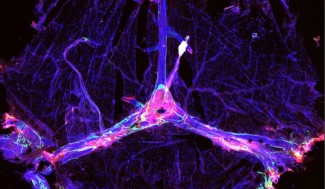Sometimes, in healthy tissues, mutated cells are seen that may or may not become malignant tumours. This phenomenon has already been described in the endometrium, oesophagus and epidermis. At Paris Brain Institute, Matthieu Peyre and his colleagues from the “Genetics and development of brain tumours” have quantified and described this phenomenon in the meninges, the membranes surrounding the brain and spinal cord. They show for the first time that oncogenic mutations exist naturally in the meninges of healthy people in a new study published in Acta Neuropathologica. Under what conditions they are likely to cause tumour growth remains to be determined.
Meningiomas are the most common central nervous system tumours in adults over 35. They originate in the meninges—the three membranes surrounding the brain and spinal cord and protecting the nervous system from shocks—and are benign in 80% of cases. Slow-growing and generally treatable by simple surgery, meningiomas are of little concern and typically attract less research interest than highly aggressive tumours such as glioblastomas.
However, 15 to 20% of meningiomas are grade II with a risk of recurrence, and 1 to 3% are grade III, which makes them malignant tumours. Often detected late, grade II and III meningiomas affect 150 people yearly in France. These patients are indeed few, but they are also at a therapeutic impasse—with a risk of significant neurological disability
Even in the most benign cases, meningeal tumours can compress certain areas of the brain, causing headaches, personality changes, balance problems or seizures. They are, therefore, a therapeutic problem that should not be overlooked.
We now know that meningiomas are most common between the ages of 60 and 70 and mainly affect women. However, their origin and mechanisms of formation are still poorly understood. “In this context, we want to understand the genesis of these tumours better, to predict their development and improve patient care”, the clinician adds.
Scrutinising normal tissues
For several years, researchers have been suspicious of mutations in the NF2 or TRAF7 genes, which are usually found in meningiomas: what if, long before the abnormal proliferation of cells that characterises the tumour, these mutations pre-existed in healthy tissue? This hypothesis remained to be confirmed. “We aim to find the cell types in which the tumour is likely to originate and ultimately to deduce the mechanisms of tumour growth from the properties of these cells”, Matthieu Peyre says.
Thanks to next-generation sequencing techniques, detecting genetic mutations at a very low frequency in normal tissues from healthy individuals is now possible. Matthieu Peyre and his colleagues took advantage of these advances to analyse 90 meningeal samples obtained post-mortem from donors who never had a brain tumour.
Surprisingly, the researchers found four different mutations in just five patients: in short, almost all patients had at least one portion of meningeal tissue with a mutation. In addition, most of these mutations were pro-tumour and involved NF2 or TRAF7.
These new results show that pathogenic mutations are widespread in normal meninges,” the researcher explains. “They are also correlated with the high frequency of meningiomas in the general population: in fact, meningiomas are found in 1% of people undergoing autopsy. This is a common occurrence !
In search of the original mutated cell
Therefore, the most mutated genes in meningiomas correspond to the most mutated genes in normal meninges. But that's not all: the team also observed a link between the location of the meninges (either at the base of the skull or above the brain) and their propensity to develop specific mutations. “This could mean that certain types of tumour only develop in a specific cell population,” Peyre says.
In the long run, exact mapping of the cell types at risk could guide researchers towards the “original mutated cell” of tumours. Indeed, meningiomas have a surprising characteristic that other brain tumours lack: malignant forms have almost the same genetic characteristics as benign forms. “We believe that the cell in which the tumorigenic mutation occurs will determine whether the tumour becomes benign or malignant”, the researcher concludes. “Hence, drawing up a single-cell atlas of the meninges would make it possible to describe all the cells of which it is composed and better grasp the relationships between the meninges and the brain.”
The researchers also want to develop targeted therapies against the genes most frequently mutated in benign and malignant meningiomas—NF2 and TRAF7—which are also mutated in normal meninges. The function of these genes is quite complex, and their exact role in tumorigenesis is not yet known. This will be the next mystery to unravel.
Sources
Boetto, J. et al. Normal meninges harbor oncogenic somatic mutations in meningioma-driver genes. Acta Neuropathologica, Septembre 2023. DOI : 10.1007/s00401-023-02635-4.







